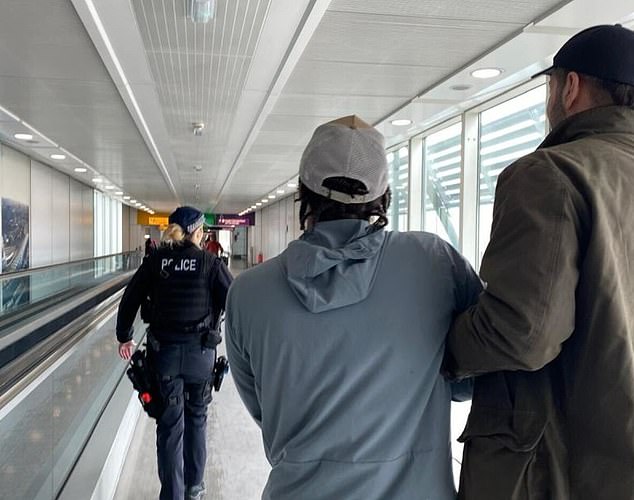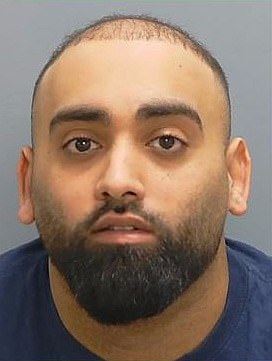As a plane from the United States touched down at Heathrow on March 13, the pilot asked that all passengers remain in their seats until further notice.
The reason became apparent after the aircraft reached the gate and the doors were opened.
Policemen, some armed, boarded and marched up to a passenger in a blue hoodie, blue shorts and white baseball cap.
An officer informed the passenger he was being arrested in connection with alleged courier fraud.
This is a growing and particularly pernicious type of scam in which crooks pose as police to persuade their victims to withdraw their savings from the bank in cash and hand it over to a supposed official courier for protection.
‘We boarded the plane as we wanted to make sure he could not get rid of his phone,’ says Detective Sergeant Marc Cananur of the City of London Police. ‘The look on his face was one of shock and bemusement that we’d managed to identify him.’

Swoop: A suspect is arrested at Heathrow airport in connection with alleged courier fraud after arriving on a flight from New York
In custody, the suspect refused to cooperate or give his phone PIN.
‘So I shone the phone in his face to open it – he hated that,’ says DS Cananur, who unlocked the phone to potentially get data that could lead to the suspect’s associates and victims.
The man, who hasn’t been named, is being questioned in connection with an investigation into around £250,000 allegedly stolen from 13 victims.
The arrest was just one skirmish in a long-running war against courier frauds that have caused untold harm and show no sign of abating. In 2020 losses to courier fraud totalled £14.1million.
Last year, the figure was £19.5million, with 1,720 confirmed victims. Because not all frauds are reported, the actual figure is likely to be significantly higher.
The fraud typically starts with one of the more articulate criminals in a gang phoning and introducing themselves as a police officer, giving a collar number and saying: ‘We have identified vulnerability on your bank account.’
The target is advised to check that the call is genuine by putting down the phone and dialling 999 or 101 and asking to be put through to the ‘officer’ they have just spoken to.
But the gang will not have ended the call at their end. This means that when the victim thinks they are phoning the police they are still connected to the crooks, and the call will be taken by another gang member posing as a police switchboard operator, who will go through a charade of supposedly putting the call through to the ‘officer’ they initially spoke to.
Next, the ‘officer’ will falsely claim that there are some suspicious transactions on the victim’s account. They will read out a list of payments – a washing machine bought from Argos in Birmingham is a line that is often used.
Their story is made more believable because the crooks will already have key details about their target, such as the name of their bank, and they are adept at using technical police jargon to sound genuine.
The victims are usually of a generation that does not use online banking and so will struggle to check the lies being spun.
The criminals will also often claim that bank employees are suspected of fraud, to dissuade the victim from discussing the issue with their branch.
The grooming takes place over days or weeks, to build up trust. The caller drip feeds worrying details about more transactions, while building rapport.
‘The suspect will ask about their family, their cat, their garden, what they’ve had for dinner, supposedly showing care and empathy,’ says DS Cananur. ‘Perversely, these victims sometimes look forward to the phone calls because it’s company, it’s someone to chat to.’
Then the trap is sprung. The ‘officer’ tells the victim their savings are at risk and urges them to go to the bank to withdraw them in cash to stop them being stolen.
He then reassures them that a police courier will collect the money from their home for safeguarding. Banks have protocols in place to prevent customers falling victim to fraud, so they will question anyone making a large cash withdrawal.
To get around this, the gangs coach their victims on what to say. They tell them to pretend they want the money to buy an expensive watch for a grandson, for example. If the bank suspects fraud they will call the police.
The criminals want to know immediately so they can disappear without a trace and find their next victim.
So they will often tell the person that they need to monitor the conversation in the bank because some staff are suspected of fraud.

Caught in the act: Mohammed Shahid was jailed for almost four years. He defrauded his victim, a man in his 80s from Rugby, of £3,000 and was arrested after going back for more

Five-year sentence: Faris Kayani admitted conspiracy to commit fraud by false representation at Winchester Crown Court in January and was jailed for five years and six months

Part of £250,000 scam: Zayd Saheb, 25, from London, was jailed for nine years for a courier fraud that saw a woman in her 80s from Southwold, Suffolk, lose £247,000.
‘They’ll ring the victim on their mobile and tell them to leave it in their pocket so they can listen,’ DS Cananur explains.
‘They emphasise that it’s for the victim’s safety, but really they just want to know if they have the cash.’
In a common variation, the crooks claim to be officers investigating counterfeit currency. The victim is asked to help by withdrawing a large sum so that the notes can supposedly be tested for authenticity.
The lies can get quite complex, for instance fraudsters sometimes suggest that the bank staff are in cahoots with corrupt local jewellers who are importing fake gold or watches and selling them to elderly victims.
DS Cananur says: ‘The gang’s spin is that they’ve identified the brother of someone at the bank, who works at the jewellers, and the watches are fake.
‘They tell the victim, “We need you to identify those corrupt individuals by buying a watch, and Scotland Yard will reimburse you the next morning”.’
The victim then uses their own cash to buy a watch – and is later convinced to hand over the watch as well. The fraudsters typically target people who live alone and don’t have someone to turn to for advice. They do so using information obtained both legally and illegally.
Mobility chair and stairlift firms might lawfully sell marketing lists of customers, for example, while other information such as a person’s bank can be obtained through compromised data sold on the dark web.
When the victim has withdrawn their savings, the gang says officers will collect it and move it to a ‘Police Bank Account’ for protection. They may also convince them to hand over valuables to be protected in a ‘New Scotland Yard safe’.
Next, they’ll ask the victim to read out a series of serial numbers on the notes, claiming it’s to check if they’re counterfeit. In reality, they want to confirm that the victim has got the money.
‘Then they’ll say the notes have been identified as counterfeit and they need to collect them for evidence. That’s the justification for sending the courier.
‘They’ll often also say they need to issue a new bank card as well because the victim’s existing card has been compromised.
‘They might ask for just two digits of their PIN numbers, the first and fourth, then say “sorry, the line broke up, can we have the second and third?”. Then they’ve got the full PIN.’
A courier will turn up, give a pre-arranged password and sometimes show a fake warrant card, and the loot is whisked away.
According to the City of London Police, the leading force on fraud, the typical victims are white, well-to-do, and with an average age of 78.
The loss is, on average, around £10,000. The largest amount stolen last year was £5.3million, from a retired director of a London banking company in his 80s.
The areas most likely to be scammed are affluent counties with easy links to London. That’s because Camden, north London, is the epicentre of the gangs.
A snapshot of some cases from last month shows the extent of these crimes. Zayd Saheb, 25, from London, was jailed for nine years for a courier fraud that saw a woman in her 80s from Southwold, Suffolk, lose £247,000.
She had been persuaded by fake detectives to hand over cash and, in an increasingly common tactic, to buy gold bullion bars. The money has not been recovered but she was reimbursed by her bank.
‘Courier fraud is a cruel and despicable crime and is a growing problem nationally, targeting predominantly elderly and vulnerable people,’ says DC Dan Steel of Suffolk Police.
In March, three Northampton cases saw victims lose £5,000, £10,000 and £20,000. Bedfordshire Police reported two victims, one losing £13,000 and the other £48,000.
Faris Kayani, from Reading, admitted conspiracy to commit fraud by false representation at Winchester Crown Court in January and was jailed for five years and six months.

Confidence trick: Courier fraud is a type of scam in which crooks pose as police to persuade their victims to hand over cash to a supposed official courier for protection
Last month, Mohammed Shahid, 37, from London, was jailed for almost four years. He had already defrauded his victim, a man in his 80s from Rugby, of £3,000 and was arrested after going back for more.
In Scotland, three courier fraudsters who stole more than £2million from their 86-year-old victim were jailed.
Bank industry rules introduced last October allow refunds of up to £85,000 in most cases of impersonation scams. However, these rules only apply to bank customers who are tricked into making bank transfers to fraudsters.
A spokesman for the Payment System Regulator says: ‘The rules do not cover people who physically take out cash from their bank account and hand it over to someone else, though it is entirely within the gift of banks to make reimbursements.’
But refunds cannot undo the harm caused. ‘It’s not just about the financial loss, it’s about the impact on a victim’s welfare and wellbeing,’ says DS Cananur.
‘These are often individuals that were independent and confident looking after themselves. Now every time that phone rings, they are thinking, “Who is it?” They become wary of people, their routines change, their health can decline because they are constantly worrying.’
To show just how convincing the crooks can be, DS Cananur gives the example of a woman from Kensington, west London, who last December gave gold bullion worth £3.2million to a courier gang. Police became involved after the bank flagged suspicious transactions.
She was so convinced by the fraudsters, she thought the genuine officers were the fakes. ‘She was in total denial. She slammed the door in my face, wouldn’t let me in her flat,’ DS Cananur says.
Many factors make this a tough crime to crack. The crooks use pay-as-you-go mobiles and gang members wear Covid masks and hoodies when they top them up at newsagents – paying in cash, of course. The couriers also wear face masks, using the excuse that it’s to protect the elderly victim.
Unlike bank transfers, cash and gold leave no paper trail. The criminals who are caught and prosecuted tend to be the foot soldiers – the couriers.
Their mugshots might not suggest criminal masterminds, because they are at the bottom of the organised crime gang’s hierarchy. They are, in DS Cananur’s words, ‘the lowest of the low, the sacrificial lambs’.
Asked if they show any remorse, he said: ‘Zero. You’re face-to-face with these individuals in an interview room and they will show no remorse, no willingness to identify other persons involved, no empathy towards the victim.’
These lowly gang members show few obvious trappings of wealth. Most of the money has gone higher up the hierarchy. And then where? ‘Drugs supply, firearms, and terrorism,’ says DS Cananur.
Some links in this article may be affiliate links. If you click on them we may earn a small commission. That helps us fund This Is Money, and keep it free to use. We do not write articles to promote products. We do not allow any commercial relationship to affect our editorial independence.







